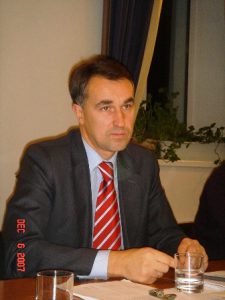Historic Overview of Lithuanian-EU Relations
1990: Lithuanian Information Bureau was founded in Brussels.
27 August 1991: The European Community recognized Lithuanian independence.
11 May 1992: Lithuania and the European Community signed the Agreement on Trade and Commercial and Economic Co-operation, which came into force 1 February 1993. On this occasion, the Declaration on Political Dialogue between the EC, its Member States and Lithuania was adopted.
1993: The EC decided to provide support to Lithuania through the PHARE programme instead of TACIS, which meant that Lithuania was attributed to Central European countries rather than being seen as one of the former republics of the Soviet Union.
22 June 1993: The Copenhagen European Council noted that it would aim at concluding Association (Europe) Agreements with the Baltic States. It also established the EU membership criteria that later became known simply as Copenhagen criteria.
18 July 1994: A Free Trade Agreement between the EU and Lithuania was signed (it entered into force 1 January 1995), to be followed by the Europe Agreement (also known as Association Agreement
12 June 1995: The Europe Agreement signed between Lithuania and the EU (came into force 1 February 1998). It completed and extended the scope of the Free Trade Agreement.
June-August 1995: First integration institutions were established in Lithuania: Governmental European Integration Commission, Department of European Integration at the Ministry of Foreign Affairs, European integration units or working groups in ministries and agencies, as well as the Centre for European Integration Studies.
8 December 1995: Lithuania submitted an official membership application. The same year, Latvia and Estonia followed suit.
28 February 1996: The European Commission Delegation to Lithuania opened in Vilnius.
January 1997: The Delegation forthe Preparation for Accession Negotiations was set up.
July 1997: The European Commission published its opinion on the preparedness of the Central and Eastern European countries for accession: in five years time, five applicant countries may be ready for EU membership. At the end of the year, the Luxembourg European Council confirmed the launch of the accession negotiations with the Czech Republic, Estonia, Hungary, Poland, and Slovenia.
18 September 1997: the Committee on European Affairs was established in the Seimas (Lithuanian Parliament).
6-8 October 1997: The first meeting of the EU-Lithuania Joint Parliamentary Committee took place.
13 December 1997: The Luxembourg European Council decided to launch accession negotiations with the Czech Republic, Cyprus, Estonia, Hungary, Poland, and Slovenia. Lithuania, along with other candidate countries, was involved in the common accession process.
30 March 1998: 10 countries started the common accession process.
3 April 1998: Lithuania began to participate in the analytical review of the conformity between the national legislation and the acquis communautaire.
May 1998: Following the closure of the Ministry of European Affairs (established December 1996) the European Committee under the Government of the Republic of Lithuania was established.
31 May 1999: The Governmental European Integration Commission approved a newly structured Lithuanias EU Accession Programme (the National Programme for the Adoption of the Acquis (LEUAP-NPAA)).
13 October 1999: The European Commission recommended that the European Council started the accession negotiations with Lithuania.
10-11 December 1999: The Helsinki European Council took the decision to launch accession negotiations with Lithuania and five other candidates, having failed the recommendation in 1997.
15 February 2000: Lithuania officially began the accession negotiations.
28 March 2000: Lithuania presented the first positions on eight negotiation chapters (Competition policy, Statistics, Science and Research, Education and Training, Common Foreign and Security Policy, Small and Medium-sized Undertakings, Culture and audio-visual policy, External relations) in Brussels.
13 December 2002: Accession negotiations with the candidate countries were officially concluded in Copenhagen.
16 April 2003: The Treaty of Accession of Lithuania and nine other countries (the Czech Republic, Cyprus, Estonia, Hungary, Latvia, Malta, Poland, Slovakia, and Slovenia) was signed in Athens.
10-11 May 2003: A referendum on the accession to the EU was held in Lithuania. The turnout was 63.37%, and 91.07% of those who participated in the referendum were in favour of the EU membership.
1 May 2004: Lithuania became an EU Member State along with the nine other states. The new Member States still have to fulfil additional requirements for the accession to the Schengen area and the Euro zone.
10-13 June 2004: First European Parliament elections in Lithuania.
11 November 2004: The Seimas ratified the EU Constitution și the first Parliament to do so among the Member States.
16 May 2006: The European Commission assessed, at the request of the Lithuanian authorities, whether Lithuania was ready to adopt the euro, and concluded that Lithuania met all the convergence criteria except the one on inflation. The average rate of inflation was slightly above the reference value.







